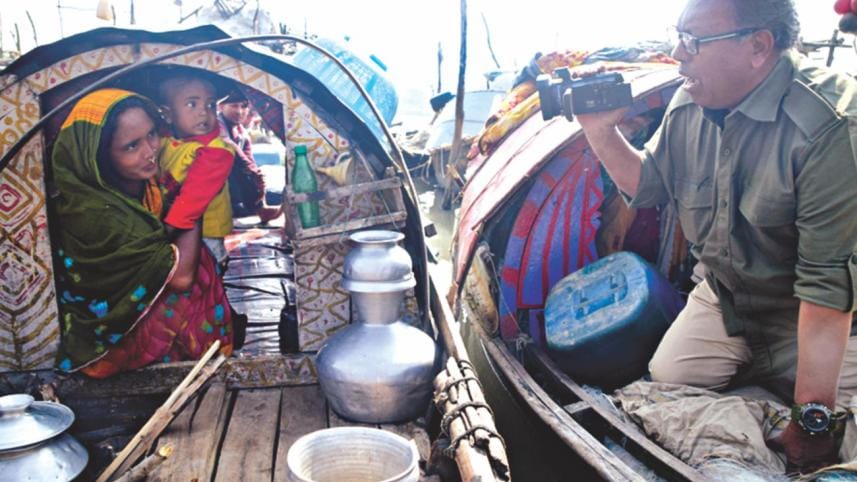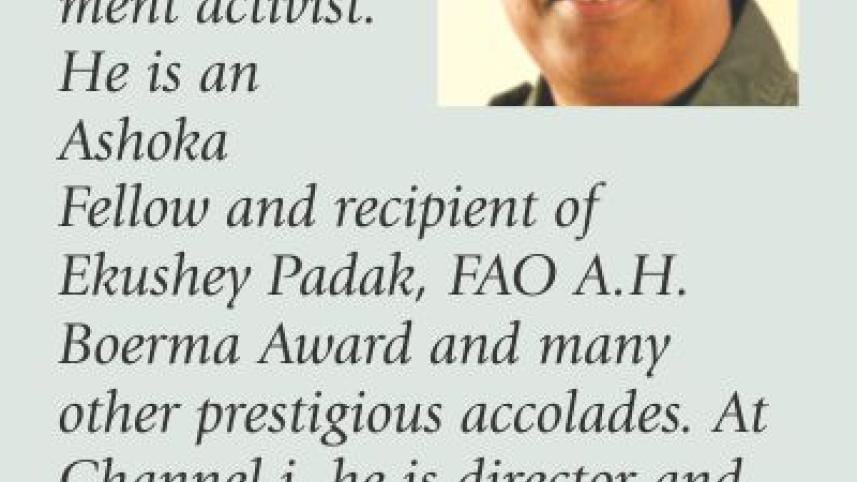Manta people: Life entwined with water

Dear readers,
A few weeks back, I went to Patuakhali, one of the famous southern districts of Bangladesh. I took a ride on the Andharmanik river to see the lives of a community who eat, drink, sleep mostly on water -- they are known as Manta. And my destination drove me to know more about the livelihood and farming practices of the coastal people.
The Andharmanik river falls into the Bay of Bengal. I knew it was going to take more than two hours to reach by speedboat to Char Montaj where the Manta community lives.
These Manta people live on boats. However, we must not confuse ourselves by calling them 'gypsy'. They are a tribe with distinct lifestyle.
I started my journey through vast water body before the sun was there in the eastern sky. Waterways are the only way to reach your destinations here.
In the waters, beside precious memories there are stories of disasters, loss and extreme pain.
In 2007, when super cyclone Sidr had its severest blow, Kalatoli union of Patuakhali saw massive damage. My speedboat took Ramnabad channel. Far away, I could notice the Paira port. After crossing the channel, Char Montaj will be only an hour away.
People were crossing my speedboat, carrying fish, vegetables and other agricultural goods. The char (landmass emerging from water areas) lands in the coastal islands are becoming really productive now-a-days. In the past, the people of the coastal areas used to face many difficulties. There was scarcity of food, crop etc. Now things have changed for the better.
A few locals riding with me pointed to another char land, named Char Lata. Cyclone Sidr had damaged many parts of it. Many people died there. If you look at the map of Bangladesh, on the southern side, you'll see several small chars. Char Lata is one of those.
As our speedboat got stuck, I asked, "Why is it stopping?"
"There isn't much water due to low tide," replied the boatman and told me not to worry much.

After my boat resumed its journey, I went through different waterways. Slowly, I was entering human habitation. This area belongs to those people who survive keeping the river close to their hearts. The place is surrounded by an amazing atmosphere.
Finally after crossing Rangabali the speedboat moved on to the Tetulia river. This river looks like a sea, believe me. After going on for some more minutes I could notice the Manta community, which means the speedboat is very near to Char Montaj.
The boats are where the Mantas live. They catch fish and live there. They hang their clothes above and put the necessaries inside the boat that serve as their own residence.
Finally, I reached Char Montaj.
It is a remote union of Patuakhali's Galachipa upazila. The people of this union have been surviving fighting against many adversities. Those who do farming on land, somehow manage to survive. The people on the boat have a very different life and a world of their own.
I found 130 families here. They were born and raised on boats. Many of their family members have died on the boats. One of the Mantas, Bibi Hazera shared her views about living a life of a Manta.
"I spent my whole life on the boat," said Hazera.
"We don't get the basic necessities -- food, cloth, house, health services, education, even for our children," she continued.
Kohinur Begum started cooking in the stove. She was surrounded by her family members.
"Are you living here since your birth?" I asked her.
"Yes, we live in the boat on the rivers. We catch fish. We don't have a place on land or a house," she replied very calmly.
Dear readers, inside the boat, there is maximum 5/6 feet space. They were born here. They live here. They sleep at night here. Here, lies household furniture. Here lie their dreams, children and family. There are racks inside where pots and other household stuff are kept.
When I got inside Kohinur's boat, yes at the tiny place, she was cooking rice and puti fish and also offered me to have lunch with her. I couldn't control my tears.
I asked Kohinur where her marriage took place.
"It happened on this very boat," she replied.
Fishing is the only profession of these people. Their men go to catch fishes. They don't know anything else for earning.
Their sorrow, happiness, and everything lie here. If it rains, they get wet. If only they had a place to stay, they could have lived a much better life. They could've sent their kids to school. Those opportunities are yet to reach the Manta community.
But they have solar panels over the boat. During the nights, they get electricity. And, they have their National Identity cards.
I learned that only 20 Manta families have been rehabilitated at the nearby cluster village. Yes, their lives are changing. Minara Begum from the cluster village was telling me now she can send her children to school, as they have a home and many other facilities.
It was time to come back. The sun was already setting in the western sky. I started my journey back and after thirty or forty minutes ride, my speedboat stopped again in the middle of the deep river. I started feeling nervous, thinking how all my team members would reach from where we started our journey in the morning. Finally, after waiting for an hour in the mid-river, a speedboat from ActionAid came to rescue us. I reached the ghat and took bus and then motorcycle since I was afraid to use the waterway in the night. The local transports are there but the entire transportation system should be more developed, I thought, especially after this horrible experience. We must consider these factors to bring about the real development of our nation.
Dear readers, in different coastal island areas of Patuakhali district, for centuries, there are families who have been residing on boats. Besides, in riverbank areas, there are many families who lost everything due to river erosion. This huge population does not fall under the coverage of our development plans. We have achieved millennium development goals. Now we are marching for sustainable development. However, these people are still left in the darkness. It is a must to bring this matter under consideration in terms of policy planning, that's what I think.
Dear readers, Bangladesh is a very small country in the world map. Each locality of this country shines bright with plenty of diversity and cultural wealth. As there are many problems in all the areas, there are also examples of the people marching forward overcoming many obstacles. I tried to unearth the real stories of coastal areas. I tried to look into the lifestyle and advantages and disadvantages of the people to understand where the coastal people stand. I hope, to get rid of the adversities the coastal people face, government initiatives will be taken with much effect. At the same time, through effective development planning, the potentialities of the coastal areas will also be discovered and neglected people of our country will get fundamental rights.




 For all latest news, follow The Daily Star's Google News channel.
For all latest news, follow The Daily Star's Google News channel.
Comments